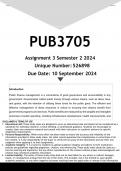PUB3705
Assignment 3 Semester 2 2024
Unique Number: 526898
Due Date: 10 September 2024
Introduction
Public finance management is a cornerstone of good governance and accountability in any
government. Governments collect public money through various means, such as taxes, fees,
and grants, with the intention of utilizing these funds for the public good. The efficient and
effective management of these resources is critical to ensuring that citizens benefit from
government programs and services. Public benefits are measured by the tangible and intangible
outcomes of public spending, including infrastructure development, health improvements, and
DISCLAIMER & TERMS OF USE
1. Educational Aid: These study notes are designed to serve as educational aids and should not be considered as a
substitute for individual research, critical thinking, or professional guidance. Students are encouraged to
conduct their own extensive research and consult with their instructors or academic advisors for specific
assignment requirements.
2. Personal Responsibility: While every effort has been made to ensure the accuracy and reliability of the
information provided in these study notes, the seller cannot guarantee the completeness or correctness of all
the content. It is the responsibility of the buyer to verify the accuracy of the information and use their own
judgment when applying it to their assignments.
3. Academic Integrity: It is crucial for students to uphold academic integrity and adhere to their institution's
policies and guidelines regarding plagiarism, citation, and referencing. These study notes should be used as a
tool for learning and inspiration, but any direct reproduction of the content without proper acknowledgment and
citation may constitute academic misconduct.
4. Limited Liability: The seller of these study notes shall not be held liable for any direct or indirect damages,
losses, or consequences arising from the use of the notes. This includes, but is not limited to, poor grades,
academic penalties, or any other negative outcomes resulting from the application or misuse of the information
prov
]
, For additional support +27 81 278 3372
Introduction
Public finance management is a cornerstone of good governance and accountability in any
government. Governments collect public money through various means, such as taxes,
fees, and grants, with the intention of utilizing these funds for the public good. The efficient
and effective management of these resources is critical to ensuring that citizens benefit from
government programs and services. Public benefits are measured by the tangible and
intangible outcomes of public spending, including infrastructure development, health
improvements, and educational achievements. In this regard, it is essential to assess public
money spending with a focus on fruitless and wasteful expenditure, output and outcomes,
and accountability for outcomes. This essay will explore the measuring of public benefits in
relation to the spending of public funds, emphasizing key aspects such as fruitless and
wasteful expenditure, the relationship between output and outcomes, and the accountability
mechanisms in place to ensure public money is well-spent.
Fruitless and Wasteful Expenditure
Fruitless and wasteful expenditure refers to any spending by a public entity that could have
been avoided had proper planning, oversight, and management been in place. According to
the Public Finance Management Act (PFMA) of South Africa, fruitless and wasteful
expenditure means expenditure made in vain and would have been avoided had reasonable
care been exercised (National Treasury, 2019). This type of expenditure is particularly
damaging because it represents a loss of resources that could have been used to deliver
essential services. Fruitless and wasteful expenditure often results from poor management,
lack of accountability, or misalignment between policy goals and the implementation
processes.
In many cases, fruitless and wasteful expenditure arises from delayed projects, contract
overruns, or the misallocation of funds. For instance, if a government department pays for
the rental of office space that is not utilized due to delayed relocation, this would be classified
as fruitless and wasteful. Not only does this waste taxpayer money, but it also erodes public
trust in the government’s ability to manage resources effectively.
According to De Jager and Swanepoel (2017), reducing fruitless and wasteful expenditure
requires strong oversight mechanisms, including internal audits, public participation in
budget processes, and regular evaluations of projects. Public financial managers are





